Once Upon a Time in the Top Spot: Fleetwood Mac, Fleetwood Mac

For many casual fans of Fleetwood Mac, there’s a perception that the band first became a big deal in America when they released Rumours in 1977 – indeed, there are some who still believe that it’s the only Fleetwood Mac album that matters – but while that was certainly the tipping point when they transformed into full-fledged rock gods, it’s hard to argue against the career importance of their self-titled 1975 album, which became the first #1 album of their career 39 years ago today.
First things first: it’s always important to clarify that it’s the 1975 self-titled album, because Fleetwood Mac had already kicked off their career back in ’68 with a self-titled album. That one was during the Peter Green years, however, while this one introduced the world at large to the latest additions to the band’s lineup: a couple of young up-and-comers named Lindsey Buckingham and Stevie Nicks.
Its profile may not be quite as substantial as that of Rumours, but when you look at the track listing for Fleetwood Mac, it’s hard to imagine that anyone could see it as anything less than a ‘70s classic, given that it features “Over My Head,” “Rhiannon,” “Say You Love Me,” “Warm Ways,” and “Landslide.” Granted, this is the studio version of “Landslide,” which was never actually released as one of the album’s singles – it took until the 1998 live version from The Dance for the song to actually enter the Billboard Hot 100 – but it’s still pretty darned good.
Fleetwood Mac spent only just the one week at the top of the Billboard Top 200, but it was the magazine’s #2 album on the year-end charts for 1976, and it has since gone on to earn platinum status five times over. Sadly, it wasn’t nearly as successful in the UK –the only successful single was “Say You Love Me,” which only hit #40, and the album came and went with little notice – but once Rumours became a phenomenon on both sides of the Atlantic, the British masses finally paid it some attention, sending it to #23 on the UK album charts. A belated victory, yes, but a victory nonetheless.


